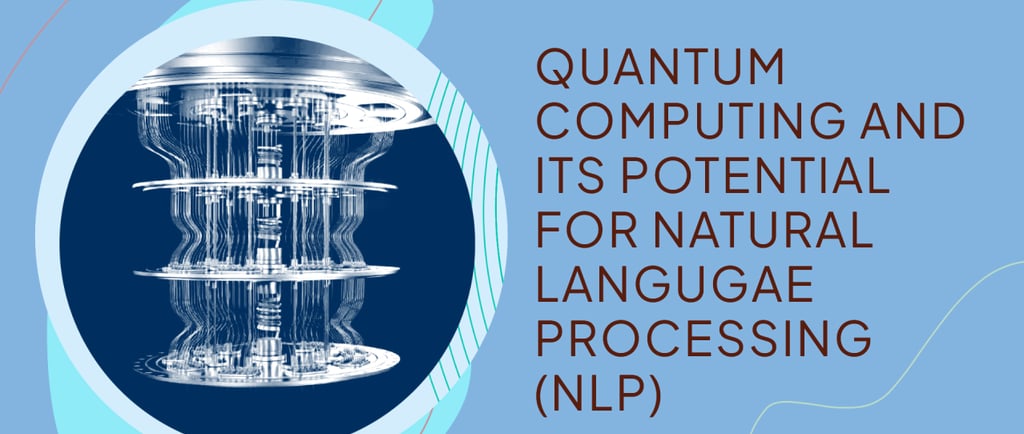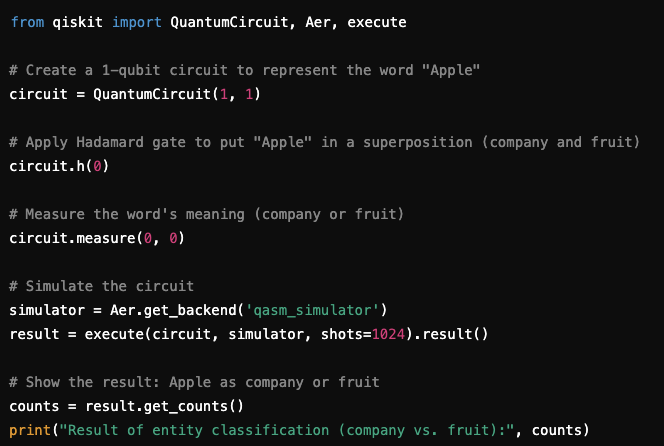Quantum Computing and Its Potential for NLP
The fascinating subject that’s gaining more and more traction: quantum computing. As someone deeply involved in Natural Language Processing (NLP), I was curious to explore how this cutting-edge technology might impact my field. I try to share my sporadic reading, watching YouTube videos, talking with experts, consulting with AI, and some coding exercises went so I got a better realistic understanding.
AI THOUGHT LEADERSHIP
9/22/20243 min read


The fascinating subject that’s gaining more and more traction: quantum computing. As someone deeply involved in Natural Language Processing (NLP), I was curious to explore how this cutting-edge technology might impact my field. I try to share my sporadic reading, watching YouTube videos, talking with experts, consulting with AI, and some coding exercises went so I got a better realistic understanding.
What is Quantum Computing?
To put it simply, quantum computing leverages the principles of quantum mechanics, such as superposition and entanglement, to process information in ways that classical computers can’t.
- Superposition allows quantum bits (qubits) to exist in multiple states (both 0 and 1) at the same time, rather than being restricted to a single binary state like classical bits. This means quantum computers can handle many possibilities simultaneously, offering immense potential for solving complex problems.
- Entanglement is a phenomenon where qubits become connected, such that the state of one qubit instantly affects the state of another, even if they’re far apart. This allows for powerful parallel processing.
Theoretically, these features could make quantum computers much faster and more powerful for certain tasks compared to classical computers, especially when dealing with large datasets or optimization problems.
Applying Quantum Computing to NLP
As someone who regularly deals with large volumes of text data, entity extraction, and semantic analysis, I wondered: Can quantum computing improve these processes? The answer isn’t straightforward, but the potential is intriguing.
Current State of NLP
Currently, tasks like named entity recognition (NER), text classification, and sentiment analysis are handled effectively using classical machine learning and deep learning models. Libraries like SpaCy and BERT have made it easier to parse, understand, and extract meaning from text. These processes are fast and efficient—especially with the help of modern GPUs—but as the data grows, the computational cost increases.
How Quantum Computing Could Help
Quantum computing offers the potential to accelerate certain NLP tasks, especially those involving search, optimization, or ambiguity resolution. Here’s an example to illustrate:
- Superposition and Ambiguity Resolution: In NLP, words often have multiple meanings, depending on context. Consider the word "Apple"—it could refer to the company or the fruit. Using classical systems, disambiguating these meanings requires processing the word in context and determining the most likely interpretation. With superposition, quantum computers could consider multiple meanings simultaneously, then collapse to the correct interpretation based on context. This could lead to faster, more accurate entity extraction.
- Faster Search and Optimization: Quantum algorithms like Grover’s search algorithm could potentially offer speedups for searching large datasets, such as quickly finding entities in a long legal document or identifying key themes in unstructured text.
However, this is still theoretical for now, and practical quantum NLP applications are not yet available. Most quantum systems are in the NISQ (Noisy Intermediate-Scale Quantum) stage, meaning they are still prone to errors and limited in their computational power.
Experimenting with Quantum Simulations
While I haven’t yet been able to apply quantum computing directly to NLP in a practical way, I’ve spent some time exploring quantum simulations using tools like Qiskit (IBM’s quantum computing framework). These simulations are run on classical computers but allow you to test quantum algorithms and understand how they work.
For example, I ran a simulation to see how superposition could handle ambiguous entities in text:


The Future of Quantum NLP
While quantum computing is still in its infancy, it’s clear that it holds immense potential for fields like NLP. Here's what I believe the future might hold:
Quantum Machine Learning (QML)
Quantum machine learning (QML) is an area with great promise. As NLP relies heavily on machine learning models, quantum-enhanced machine learning could potentially offer new ways to train models faster and with less data. For example, training a model like BERT or LLMs could be made more efficient with quantum speedups.
Quantum Algorithms for NLP
We may see the development of new quantum algorithms specifically tailored for NLP tasks, like entity extraction or sentiment analysis. These algorithms could leverage quantum mechanics to handle complex text patterns, semantic meanings, and large datasets more efficiently than classical algorithms.
Perspective on Upcoming Advancements
Looking ahead, quantum technology is expected to grow rapidly, especially in industries where optimization, security, and massive data processing are critical. However, for NLP, we are still several years away from seeing quantum technology deployed in practical applications.
Arash Hajikhani, PhD
Showcasing my academic profile and projects and blogpost series
contact
Blogpost Subscription
© 2024. All rights reserved.
